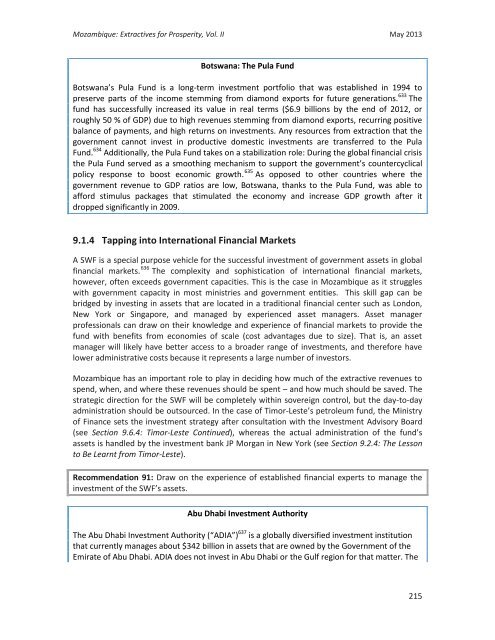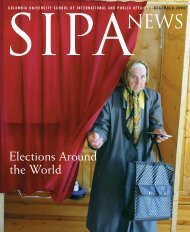Mozambique - School of International and Public Affairs - Columbia ...
Mozambique - School of International and Public Affairs - Columbia ...
Mozambique - School of International and Public Affairs - Columbia ...
You also want an ePaper? Increase the reach of your titles
YUMPU automatically turns print PDFs into web optimized ePapers that Google loves.
<strong>Mozambique</strong>: Extractives for Prosperity, Vol. II May 2013<br />
Botswana: The Pula Fund<br />
Botswana’s Pula Fund is a long-term investment portfolio that was established in 1994 to<br />
preserve parts <strong>of</strong> the income stemming from diamond exports for future generations. 633 The<br />
fund has successfully increased its value in real terms ($6.9 billions by the end <strong>of</strong> 2012, or<br />
roughly 50 % <strong>of</strong> GDP) due to high revenues stemming from diamond exports, recurring positive<br />
balance <strong>of</strong> payments, <strong>and</strong> high returns on investments. Any resources from extraction that the<br />
government cannot invest in productive domestic investments are transferred to the Pula<br />
Fund. 634 Additionally, the Pula Fund takes on a stabilization role: During the global financial crisis<br />
the Pula Fund served as a smoothing mechanism to support the government’s countercyclical<br />
policy response to boost economic growth. 635 As opposed to other countries where the<br />
government revenue to GDP ratios are low, Botswana, thanks to the Pula Fund, was able to<br />
afford stimulus packages that stimulated the economy <strong>and</strong> increase GDP growth after it<br />
dropped significantly in 2009.<br />
9.1.4 Tapping into <strong>International</strong> Financial Markets<br />
A SWF is a special purpose vehicle for the successful investment <strong>of</strong> government assets in global<br />
financial markets. 636 The complexity <strong>and</strong> sophistication <strong>of</strong> international financial markets,<br />
however, <strong>of</strong>ten exceeds government capacities. This is the case in <strong>Mozambique</strong> as it struggles<br />
with government capacity in most ministries <strong>and</strong> government entities. This skill gap can be<br />
bridged by investing in assets that are located in a traditional financial center such as London,<br />
New York or Singapore, <strong>and</strong> managed by experienced asset managers. Asset manager<br />
pr<strong>of</strong>essionals can draw on their knowledge <strong>and</strong> experience <strong>of</strong> financial markets to provide the<br />
fund with benefits from economies <strong>of</strong> scale (cost advantages due to size). That is, an asset<br />
manager will likely have better access to a broader range <strong>of</strong> investments, <strong>and</strong> therefore have<br />
lower administrative costs because it represents a large number <strong>of</strong> investors.<br />
<strong>Mozambique</strong> has an important role to play in deciding how much <strong>of</strong> the extractive revenues to<br />
spend, when, <strong>and</strong> where these revenues should be spent – <strong>and</strong> how much should be saved. The<br />
strategic direction for the SWF will be completely within sovereign control, but the day-to-day<br />
administration should be outsourced. In the case <strong>of</strong> Timor-Leste’s petroleum fund, the Ministry<br />
<strong>of</strong> Finance sets the investment strategy after consultation with the Investment Advisory Board<br />
(see Section 9.6.4: Timor-Leste Continued), whereas the actual administration <strong>of</strong> the fund’s<br />
assets is h<strong>and</strong>led by the investment bank JP Morgan in New York (see Section 9.2.4: The Lesson<br />
to Be Learnt from Timor-Leste).<br />
Recommendation 91: Draw on the experience <strong>of</strong> established financial experts to manage the<br />
investment <strong>of</strong> the SWF’s assets.<br />
Abu Dhabi Investment Authority<br />
The Abu Dhabi Investment Authority (“ADIA”) 637 is a globally diversified investment institution<br />
that currently manages about $342 billion in assets that are owned by the Government <strong>of</strong> the<br />
Emirate <strong>of</strong> Abu Dhabi. ADIA does not invest in Abu Dhabi or the Gulf region for that matter. The<br />
215

















